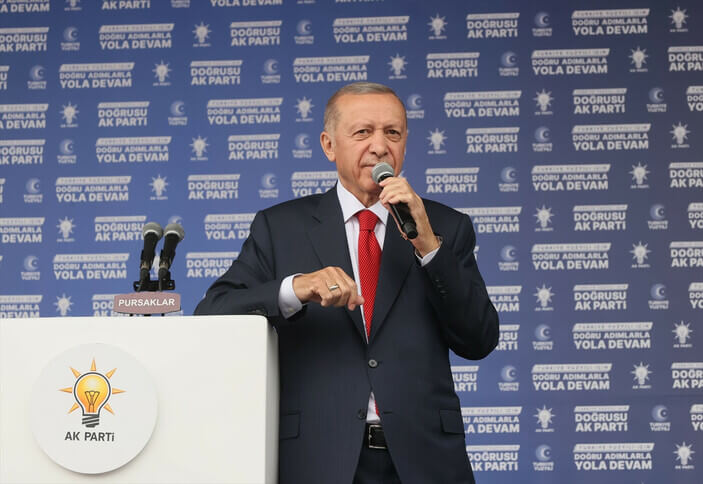Türkmen Terzi
Turkish President Recep Tayyip Erdoğan claimed victory on May 14, garnering 49.5 percent of the vote in the presidential election, just shy of the majority required to avoid a runoff. However, his ruling Justice and Development Party (AKP) lost over 7 percent of the vote compared to the 2018 parliamentary elections. As the election dynamics remain unchanged, many doubt the prospects for change in the runoff. Erdoğan’s concerns seem to have shifted from the future of the AKP to the survival of the ruling Public Alliance, which was established in February 2018 between the AKP and the Nationalist Movement Party (MHP).
The Supreme Election Board (YSK), prominent figures from the main opposition Republican People’s Party (CHP) and certain journalists and media houses were accused by some on election night of manipulating the voting results to keep Erdoğan as president. Both local and international election observers have reported in the past decade that elections in Turkey were not free and fair.
Turkish voters will return to the polls on May 28 for a runoff presidential election. This follows the failure of both Erdoğan and his opposition rival Kemal Kılıçdaroğlu to secure the required 50 percent to win the presidency. As Kılıçdaroğlu garnered 44.8 percent of the vote, the CHP, other parties and non-partisan NGOs have reportedly been more vigilant in protecting ballot boxes from potential tampering.
The AKP has faced numerous accusations of electoral fraud and violence since the 2014 local elections. Tactics allegedly employed by Erdoğan’s AKP to sway the vote include manipulating opinion polls, ballot stuffing, double voting, proxy voting, prematurely announcing the AKP’s victory through the state-run Anadolu Agency (AA) and imposing restrictions on social media. Nevertheless, the opposition parties, especially the main opposition CHP, are reportedly deploying strategic measures to counter any such manipulation due to the bitter experience of the 2015, 2018 and 2019 elections in which the AKP was accused of fraud by critics and observers.
Turkey’s opposition candidate Kılıçdaroğlu has accused Russia of spreading disinformation ahead of the May 14 presidential and parliamentary elections. Although Kılıçdaroğlu has yet to provide specific evidence to support his allegations against the Kremlin, some Turkish journalists have reported interference by some of Kılıçdaroğlu’s own aides in the election process and accused them of working in favor of Erdoğan instead of the opposition they purportedly serve.
Several Turkish media outlets that are typically critical of Erdoğan’s AKP, such as Sözcü TV and Halk TV, faced criticism for using data provided by AA, which has been accused of inflating Erdoğan’s votes during the early hours of vote counting. There have been claims that these stations contributed to a premature narrative of Erdoğan’s victory.
Exiled journalist Said Safa alleged that some figures who are usually critical of the Erdoğan administration manipulated the election in favor of the Public Alliance. Another journalist living in exile, Cevheri Güven, claimed on his YouTube channel that CHP Vice Chairman Tuncay Özkan, who owns KRT TV and ANKA, assisted Erdoğan on election night.
Selahattin Demirtaş, former co-chair of the pro-Kurdish Peoples’ Democratic Party (HDP) who has been imprisoned since 2016, accused the Public Alliance of vote rigging. According to Demirtaş, many AKP and MHP members masqueraded as opposition party observers on ballot box committees with the intention of altering votes to favor the Public Alliance. Demirtaş further alleged that Interior Minister Süleyman Soylu established a digital center to manipulate votes.
Erdoğan has appointed a relative to the YSK, and critics argue that he has consolidated his power within the army by purging half its generals. These moves, critics say, make it easier for him to exert influence over the voting process without resorting to direct manipulation of ballot boxes. There have been allegations that the YSK has tampered with vote counts to favor Erdoğan, even attributing votes from the opposition Green Left Party to the MHP and thereby increasing the tally for the ultranationalist candidate Sinan Oğan.
Given Erdoğan’s control over key state institutions and his alliances with influential figures, there is apprehension about potential irregularities in the upcoming runoff. Critics worry that Erdoğan and his allies may attempt to rig the votes to maintain his grip on power and block the CHP’s bid to reinstate the parliamentary system.
Local and international election observers, including the Organization for Security and Co-operation in Europe Parliamentary Assembly (OSCE PA), have reported that the ruling party enjoyed an unjustified advantage in the elections due to biased media coverage and restrictions on freedom of expression and assembly. These reports have raised serious concerns about whether the runoff can accurately reflect the democratic will of the Turkish people.

